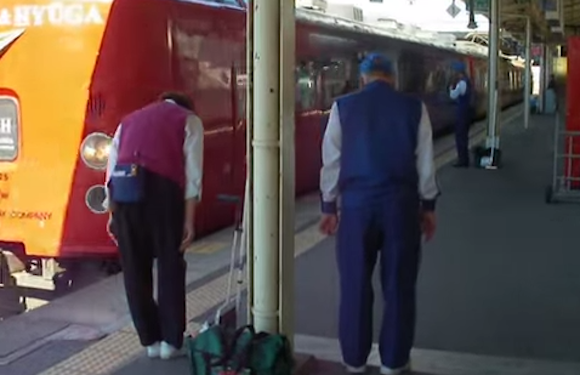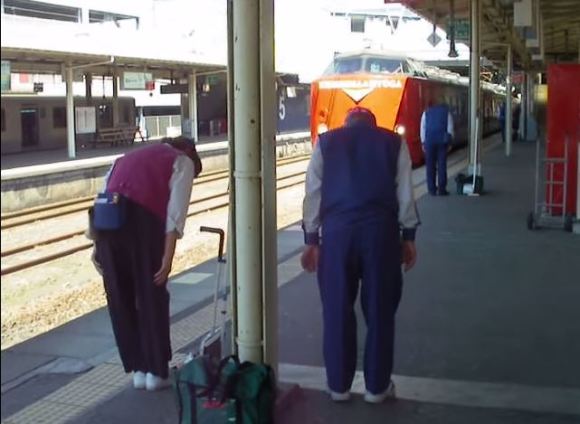
The cleaning crews who maintain Japan’s high-speed bullet trains have a mere seven minutes to make the interior of the train spotlessly clean for its next journey. Those seven minutes are carefully divided into different tasks to make sure everything gets done in the allotted time.
Another curious detail people often notice about these cleaners is the way they bow as trains are entering and exiting the station. While this act is generally thought to be a respectful gesture, the intended recipient of the bowing seems to be a matter of great debate, with plenty of conflicting opinions out there, even among the Japanese!
The following short video clip of cleaning staff bowing to an incoming train on the platform prompted a host of reactions from non-Japanese. Some were confused by the meaning behind the bowing, while others praised the act as a sign of respect. One common topic of discussion that emerged, however, was what exactly the staff were bowing to.
Was the bowing directed towards the train? The passengers? The driver? All of the above? Unsurprisingly, commenters didn’t exactly reach a consensus, but the vast majority agreed that regardless, the act was a sign of respect that should be commended.
One writer at Japanese site Lakatan became interested in the reactions of foreigners regarding such a typical Japanese scene, and subsequently translated several of their comments into Japanese for a broader Japanese audience to read. The following are some of those reactions, organized by the country of origin of the commentator.
Note: The following quotes are based on Japanese translations of the original comments, so they may differ slightly from the originals.
Reactions of foreigners who saw the video clip:
Aruba (Netherlands Antilles)
“It’s great that the Japanese value the importance of paying respect to others. The West has a lot to learn from them.”
Brazil
“Japan is a terrific country! The only problem to speak of is its high suicide rate :( “
Canada
“Nice. In my personal experience, if I wave as the train is arriving at the station, the train driver will usually wave back.”
China
“I’m Chinese, and I honestly don’t feel comfortable with all the bowing in Japan. It’s because in China, people mostly bow to honor those who have passed away.”
Italy
“They are bowing to the passengers, the drivers, and to each other, right?”
Netherlands
“Didn’t anyone else notice that no one was riding in the train?”
United Kingdom
“Japanese traditions are the best in the world! We’ve lost courtesy and grace in the West.”
United States
“It says in the title that they’re bowing for the train, but isn’t it for the passengers riding inside?”
“If people in the West were more respectful to each other, America wouldn’t have become the police state it now is.”
“A strange aspect of Japanese culture…”
“I think they’re going a bit overboard, but it’s good. ”
“Lovely stuff!”
“I respect this. We definitely need more of this in the West.”
“What the Japanese are doing is great. Please stay like that!”
“Yup, when I was in Japan, even a car driver would bow if he cut you off.”
“I read this somewhere, but Japan is the only country in the world that has managed to hang onto its culture and traditions while making scientific progress.”
▼Bowing as the train comes in
Taking it a step further, here are the reactions of some Japanese people who read the foreigners’ comments and posted their own thoughts on Lakatan:
“The cleaners are only doing it because it’s a rule of the company. They wouldn’t continue doing it if they didn’t have to.”
“It’s refreshing to view Japanese etiquette from the eyes of foreigners. But the ideals of service and ‘business smiles’ originally came from America. That spirit has died out in America, so the Japanese may also lose their sense of courtesy someday.”
“All things begin and end with courtesy.”
“I think that they bow because they take pride in their jobs. The passengers don’t feel like they’re being bowed to. It’s a virtue of the cleaning people.”
“Isn’t it just a regular greeting to the train driver and the train that conveys something like, ‘Work hard today!’ and, ‘We appreciate your efforts!’ And wasn’t the idea that inanimate objects have a spirit (tsukumogami) born out of the custom of showing respect? Or maybe it’s vice versa.”
“Korea’s Confucianist culture also emphasizes respect.”
“There are many schools where the students bow when entering and leaving the gate.”
“It’s the same as Pavlov’s dogs, or the deer in Nara.”
“I’m surprised that there are so many negative comments. Do we really need to find fault with this?”
▼Bowing as the train comes to a stop
Whose thoughts do you find most compelling–the foreigners’, or the Japanese? If you’re ever in Japan and waiting on a train platform, maybe you too can see the sight in person and decide for yourself.



 This is how Japan’s train-cleaning crews clean the Shinkansen in only seven minutes
This is how Japan’s train-cleaning crews clean the Shinkansen in only seven minutes Japanese custom of bowing to cars at crosswalks keeps locals safe, warms Internet’s hearts【Video】
Japanese custom of bowing to cars at crosswalks keeps locals safe, warms Internet’s hearts【Video】 Japanese conductor apologizes for “inconvenience of many foreign passengers being on the train”
Japanese conductor apologizes for “inconvenience of many foreign passengers being on the train” Foreign tourists on Shinkansen bullet train break suitcase etiquette, angering local passengers
Foreign tourists on Shinkansen bullet train break suitcase etiquette, angering local passengers The 10 most annoying things foreign tourists do on Japanese trains, according to locals
The 10 most annoying things foreign tourists do on Japanese trains, according to locals Lawson adds doughnuts to its convenience store sweets range, but are they good enough to go viral?
Lawson adds doughnuts to its convenience store sweets range, but are they good enough to go viral? Viral Japanese cheesecake from Osaka has a lesser known rival called Aunt Wanda
Viral Japanese cheesecake from Osaka has a lesser known rival called Aunt Wanda The best Hobonichi diaries, covers and stationery for 2026
The best Hobonichi diaries, covers and stationery for 2026 Take a trip to Japan’s Dododo Land, the most irritating place on Earth
Take a trip to Japan’s Dododo Land, the most irritating place on Earth Ramen for 99 yen?!? Best value-for-money noodles found at unlikely chain in Japan
Ramen for 99 yen?!? Best value-for-money noodles found at unlikely chain in Japan Minecraft User Decides to Make Kinkakuji, Eventually Creates the Entire City of Kyoto
Minecraft User Decides to Make Kinkakuji, Eventually Creates the Entire City of Kyoto Can we be just like Shohei Ohtani on a budget with a Hello Kitty cap?
Can we be just like Shohei Ohtani on a budget with a Hello Kitty cap? This gachapon capsule machine dispenses real Akoya pearls, with certificates of authenticity
This gachapon capsule machine dispenses real Akoya pearls, with certificates of authenticity Japan Extreme Budget Travel! A trip from Tokyo to Izumo for just 30,000 yen [Part 2]
Japan Extreme Budget Travel! A trip from Tokyo to Izumo for just 30,000 yen [Part 2] After 10 years of secrecy, anime song duo ClariS finally remove their masks and show their faces
After 10 years of secrecy, anime song duo ClariS finally remove their masks and show their faces Starbucks Japan releases first-ever Hinamatsuri Girls’ Day Frappuccino
Starbucks Japan releases first-ever Hinamatsuri Girls’ Day Frappuccino Japanese restaurant chain serves Dragon Ball donuts and Senzu Beans this spring
Japanese restaurant chain serves Dragon Ball donuts and Senzu Beans this spring Highest Starbucks in Japan set to open this spring in the Tokyo sky
Highest Starbucks in Japan set to open this spring in the Tokyo sky Japan Extreme Budget Travel! A trip from Tokyo to Izumo for just 30,000 yen [Part 1]
Japan Extreme Budget Travel! A trip from Tokyo to Izumo for just 30,000 yen [Part 1] Japan has only one airport named after a samurai, so let’s check out Kochi Ryoma【Photos】
Japan has only one airport named after a samurai, so let’s check out Kochi Ryoma【Photos】 Japan’s craziest burger chain takes menchi katsu to new extreme levels
Japan’s craziest burger chain takes menchi katsu to new extreme levels Japanese drugstore sells onigiri at pre-stupid era prices, but how do they compare to 7-Eleven?
Japanese drugstore sells onigiri at pre-stupid era prices, but how do they compare to 7-Eleven? Yakuzen ramen restaurant in Tokyo is very different to a yakuza ramen restaurant
Yakuzen ramen restaurant in Tokyo is very different to a yakuza ramen restaurant Tokyo Skytree turns pink for the cherry blossom season
Tokyo Skytree turns pink for the cherry blossom season Japan’s newest Shinkansen has no seats…or passengers [Video]
Japan’s newest Shinkansen has no seats…or passengers [Video] Starbucks Japan releases new sakura goods and drinkware for cherry blossom season 2026
Starbucks Japan releases new sakura goods and drinkware for cherry blossom season 2026 Foreigners accounting for over 80 percent of off-course skiers needing rescue in Japan’s Hokkaido
Foreigners accounting for over 80 percent of off-course skiers needing rescue in Japan’s Hokkaido Super-salty pizza sends six kids to the hospital in Japan, linguistics blamed
Super-salty pizza sends six kids to the hospital in Japan, linguistics blamed Starbucks Japan unveils new sakura Frappuccino for cherry blossom season 2026
Starbucks Japan unveils new sakura Frappuccino for cherry blossom season 2026 Foreign tourists in Japan will get free Shinkansen tickets to promote regional tourism
Foreign tourists in Japan will get free Shinkansen tickets to promote regional tourism The 10 most annoying things foreign tourists do on Japanese trains, according to locals
The 10 most annoying things foreign tourists do on Japanese trains, according to locals Naruto and Converse team up for new line of shinobi sneakers[Photos]
Naruto and Converse team up for new line of shinobi sneakers[Photos] Is China’s don’t-go-to-Japan warning affecting the lines at a popular Tokyo gyukatsu restaurant?
Is China’s don’t-go-to-Japan warning affecting the lines at a popular Tokyo gyukatsu restaurant? Survey asks foreign tourists what bothered them in Japan, more than half gave same answer
Survey asks foreign tourists what bothered them in Japan, more than half gave same answer Japan’s human washing machines will go on sale to general public, demos to be held in Tokyo
Japan’s human washing machines will go on sale to general public, demos to be held in Tokyo Starbucks Japan releases new drinkware and goods for Valentine’s Day
Starbucks Japan releases new drinkware and goods for Valentine’s Day We deeply regret going into this tunnel on our walk in the mountains of Japan
We deeply regret going into this tunnel on our walk in the mountains of Japan Studio Ghibli releases Kodama forest spirits from Princess Mononoke to light up your home
Studio Ghibli releases Kodama forest spirits from Princess Mononoke to light up your home Major Japanese hotel chain says reservations via overseas booking sites may not be valid
Major Japanese hotel chain says reservations via overseas booking sites may not be valid Put sesame oil in your coffee? Japanese maker says it’s the best way to start your day【Taste test】
Put sesame oil in your coffee? Japanese maker says it’s the best way to start your day【Taste test】 No more using real katana for tourism activities, Japan’s National Police Agency says
No more using real katana for tourism activities, Japan’s National Police Agency says Japanese train conductor surprises everyone on board with his English skills
Japanese train conductor surprises everyone on board with his English skills Japanese high school requires teens to kneel and bow for teaches, receives harsh online backlash
Japanese high school requires teens to kneel and bow for teaches, receives harsh online backlash The Japanese train station where staff bow to departing passengers
The Japanese train station where staff bow to departing passengers Japanese train drivers caught performing cute in-sync movements at the station 【Video】
Japanese train drivers caught performing cute in-sync movements at the station 【Video】 10 incredible tales of kindness on Japanese trains, as told by foreigners
10 incredible tales of kindness on Japanese trains, as told by foreigners Train driver sues Japan Rail…over 56 yen for a one-minute delay
Train driver sues Japan Rail…over 56 yen for a one-minute delay Race against the clock: Shinkansen staff have just 7 minutes to get bullet train ready to ride
Race against the clock: Shinkansen staff have just 7 minutes to get bullet train ready to ride Inspiring or Inconsiderate? Foreigner Plays Guitar for Frustrated Train Passengers While Stranded in Typhoon
Inspiring or Inconsiderate? Foreigner Plays Guitar for Frustrated Train Passengers While Stranded in Typhoon Foreigners in Japan sound off on the top four quirks of the Japanese job-hunting system
Foreigners in Japan sound off on the top four quirks of the Japanese job-hunting system 5 things about Japanese customer service that surprise foreign visitors
5 things about Japanese customer service that surprise foreign visitors Rugby World Cup fans slammed for singing anthems, forming human pyramids on Japanese trains
Rugby World Cup fans slammed for singing anthems, forming human pyramids on Japanese trains Japanese celebrity (sort of) apologizes for swapping seats with foreign traveler on Shinkansen
Japanese celebrity (sort of) apologizes for swapping seats with foreign traveler on Shinkansen Why do seats at some Japanese station platforms face away from the trains?
Why do seats at some Japanese station platforms face away from the trains?